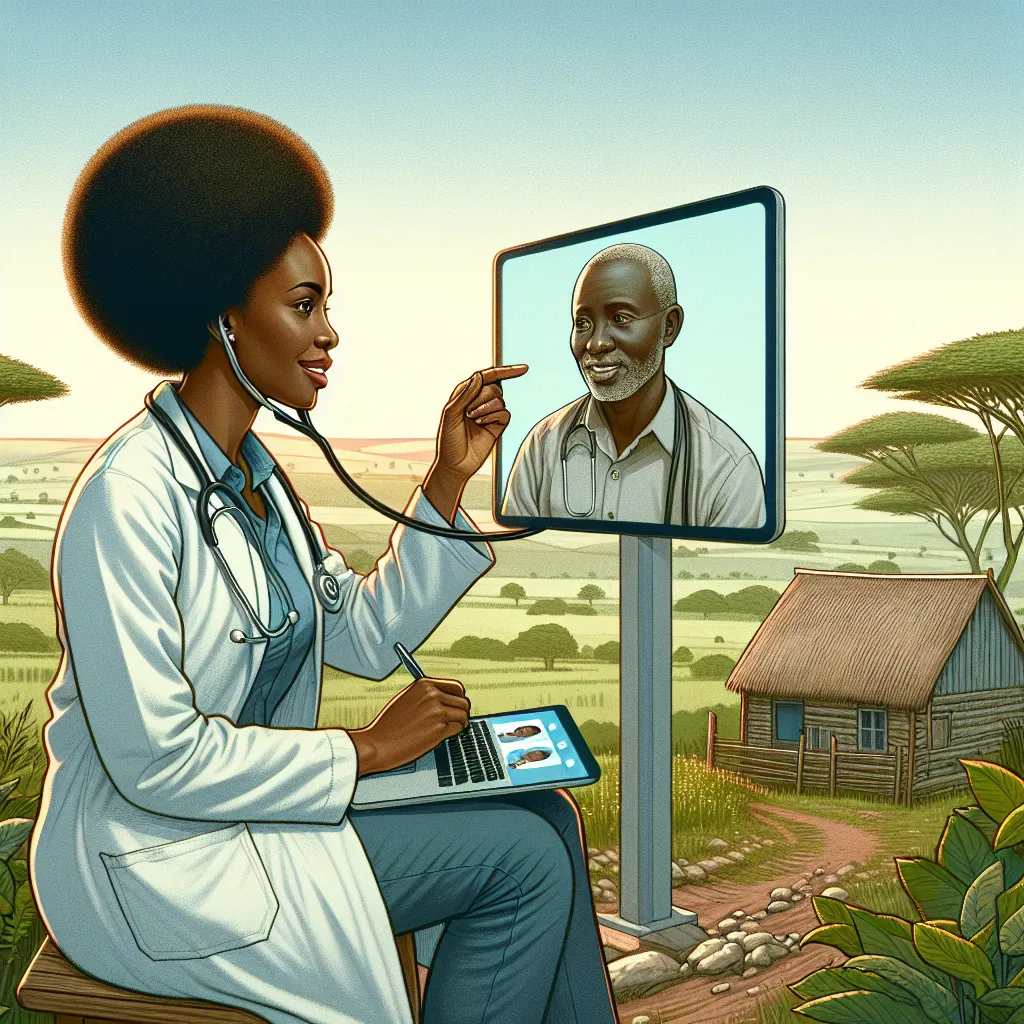Telemedicine and its impact on rural healthcare is a topic of growing importance in IELTS Writing Task 2. This subject has appeared in recent exams and is likely to continue being a relevant theme due to its global significance. Let’s explore a sample question and develop a comprehensive response that meets IELTS band 7-8 criteria.
Analyzing the Topic
Before we dive into a specific question, it’s crucial to understand the broader context of telemedicine in rural areas. This topic intersects with healthcare access, technological advancements, and social equality – all of which are common themes in IELTS Writing Task 2.

Sample Question
Let’s focus on the following question, which reflects the type of task you might encounter in your IELTS exam:
Telemedicine has become increasingly popular in recent years, especially in rural areas. Some people believe it has revolutionized healthcare access, while others argue it cannot replace traditional in-person medical care. Discuss both views and give your own opinion.
Analyzing the Question
This question requires you to:
- Discuss the positive impact of telemedicine on healthcare access in rural areas.
- Address concerns about telemedicine replacing traditional medical care.
- Present your own opinion on the matter.
Remember to maintain a balanced approach while clearly stating your position.
Sample Essay
Here’s a model essay that addresses the question:
In recent years, telemedicine has emerged as a groundbreaking solution to healthcare challenges, particularly in rural areas. While some hail it as a revolutionary approach to improving medical access, others express concerns about its limitations compared to traditional in-person care. This essay will examine both perspectives before presenting my own viewpoint.
Proponents of telemedicine argue that it has significantly enhanced healthcare access in rural regions. First and foremost, it bridges the geographical gap between patients and healthcare providers. Rural residents who previously had to travel long distances for medical consultations can now receive expert advice from the comfort of their homes. Moreover, telemedicine has made specialized care more accessible, allowing rural patients to consult with specialists who might be based in urban centers. This not only saves time and money but also ensures that rural communities receive timely medical attention, potentially improving health outcomes.
On the other hand, critics contend that telemedicine cannot fully replace traditional face-to-face medical care. They argue that physical examinations are crucial for accurate diagnoses, and virtual consultations may miss subtle signs that a doctor could detect in person. Additionally, there are concerns about the quality of care, especially for complex medical conditions that require hands-on treatment or procedures. Some also point out that telemedicine might exacerbate the digital divide, as not all rural residents have access to reliable internet connections or the necessary technology to participate in virtual consultations.
In my opinion, while telemedicine cannot entirely substitute traditional medical care, its benefits for rural areas far outweigh its limitations. The technology has proven to be a vital tool in improving healthcare access and quality of life for rural populations. It complements rather than replaces in-person care, offering a practical solution for routine check-ups, follow-up appointments, and initial consultations. Moreover, as technology advances, many of the current limitations of telemedicine are likely to be addressed.
In conclusion, telemedicine represents a significant step forward in healthcare delivery, especially for rural communities. While it may not be a complete replacement for traditional medical care, its role in enhancing access to healthcare services is undeniable. As we move forward, a balanced approach that integrates telemedicine with conventional healthcare practices will likely yield the best outcomes for rural populations.
(Word count: 370)
Writing Tips for This Topic
-
Vocabulary: Use healthcare-specific terminology to demonstrate your knowledge. Examples include “healthcare access,” “medical consultations,” “diagnoses,” and “health outcomes.”
-
Balanced Argument: Present both sides of the argument fairly before stating your opinion.
-
Specific Examples: Mention concrete ways telemedicine benefits rural areas, such as reducing travel time and providing access to specialists.
-
Clear Structure: Use clear paragraphing to separate different viewpoints and your own opinion.
-
Cohesive Devices: Employ linking words and phrases to ensure smooth transitions between ideas.
Key Vocabulary to Remember
-
Telemedicine (noun) /ˌtelɪˈmedɪsɪn/ – The remote diagnosis and treatment of patients using telecommunications technology.
-
Healthcare access (noun phrase) /ˈhelθkeər ˈækses/ – The ability of individuals to obtain and use health services.
-
Rural (adjective) /ˈrʊərəl/ – Relating to or characteristic of the countryside rather than the town.
-
Digital divide (noun phrase) /ˈdɪdʒɪtl dɪˈvaɪd/ – The gulf between those who have ready access to computers and the Internet, and those who do not.
-
Diagnosis (noun) /ˌdaɪəɡˈnəʊsɪs/ – The identification of the nature of an illness or other problem by examination of the symptoms.
-
Exacerbate (verb) /ɪɡˈzæsəbeɪt/ – Make (a problem, bad situation, or negative feeling) worse.
-
Specialized care (noun phrase) /ˈspeʃəlaɪzd keər/ – Medical care provided by a doctor who has advanced education and training in a specific area of medicine.
-
Health outcomes (noun phrase) /helθ ˈaʊtkʌmz/ – Changes in health that result from measures or specific health care investments or interventions.
Conclusion
The topic of telemedicine benefits for rural areas is likely to remain relevant in IELTS Writing Task 2. As you prepare, consider exploring related themes such as the impact of technology on healthcare, the challenges of rural development, and the ethical implications of remote medical care. Practice writing essays on these topics to enhance your skills and expand your vocabulary in this domain.
For further practice, you might want to explore how telemedicine affects healthcare access in different contexts or consider the social implications of increasing reliance on telemedicine. These related topics will help you develop a more comprehensive understanding of the subject and prepare you for a wider range of potential questions in your IELTS exam.